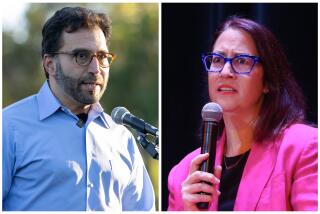Against odds, congresswoman pushes bill for funds to treat troubled students
- Share via
Reporting from Washington — Bucking the current trend toward cutting social programs in order to reduce the deficit, Rep. Grace F. Napolitano (D-Norwalk) introduced a bill Thursday that would provide $200 million for schools to hire mental health professionals to diagnose and treat psychologically troubled students before they become involved in violent or criminal behavior.
What gives Napolitano at least a glimmer of hope that her proposal might have a chance, even though budget-minded Republicans are in charge of the House, is that violence by people whose emotional problems surfaced in school is a concern that cuts across party lines.
“We were hoping that because of the recent incident in Arizona, that people would be more willing to get it out there,” Napolitano said, referring to the Jan. 8 shooting in which six people were killed and 14 others injured, including Rep. Gabrielle Giffords (D-Ariz.). The shooting suspect had repeatedly come to the attention of school officials because of disturbing behavior.
Under the legislation, grants could total up to $1 million each and would be distributed by the Substance Abuse and Mental Health Services Administration. The House approved a similar Napolitano proposal last year when Democrats were in control.
The current budget being debated in the House, however, would cut funding for mental health services and substance abuse by more than $200 million, and Republican members of Congress are looking for more places to cut, not to add similar programs.
Napolitano said she didn’t expect easy passage of the bill, but she hoped its timely subject matter would help it gain support from those who remember incidents involving disturbed young people, such as the shootings at Virginia Tech in 2007 and Columbine High School in Colorado in 1999.
“Violence is an evolutionary process that develops usually over an extended period of time,” said Tony Beliz of the Los Angeles County Department of Mental Health. He added that starting counseling early can “significantly reduce the development of maladaptive behaviors.”
Among supporters of the bill present at a panel Thursday were boxer Mia St. John and L.A. Lakers forward Ron Artest, who raised more than $650,000 for mental health charities last year.
St. John, 43, has two children, including a 21-year-old son with schizophrenia who demonstrated signs of mental health problems that reminded her of Jared Lee Loughner, the suspect in the Arizona shooting rampage, she said.
“All the signs and symptoms were there,” St. John said of Loughner. “These were signs that I saw in my son for many years. I started complaining to the school when my son was 5 years old that something was wrong.
“My son was not tested until he was in the 11th grade, and not voluntarily — the school was court-ordered,” St. John said. “By then it was too late. My son spent his graduation in a psychiatric hospital.”
Neal McCluskey, an education analyst at the Cato Institute, a libertarian Washington, D.C., think tank, said that although the bill was well-intentioned it was unlikely to pass, and that even if it did it was unlikely to produce major results.
“Based on looking at the success of other education programs, I’d say it’s a bad idea,” McCluskey said. “Rarely do we see these programs demonstrate any meaningful success.”
More to Read
Get the L.A. Times Politics newsletter
Deeply reported insights into legislation, politics and policy from Sacramento, Washington and beyond. In your inbox twice per week.
You may occasionally receive promotional content from the Los Angeles Times.










